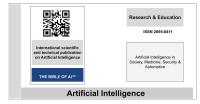Article,
Data as the main focus of “State of the art of data science in Spanish language and its application in the field of Artificial Intelligence”
The Bible of AI ™ OpenScience, (June 2021)
DOI: 10.21428/36973002.e637d5a8
Abstract
main objective of this paper is split in two parts. Firstly, it is needed to verify if there exists a cultural bias for data science in Spanish language. Secondly, we have to check how privacy data is controlled in apps, which use contact tracing techniques, and also electronic devices such as smartwatches. To carry out the first part of the study, we have investigated about datasets in English and Spanish language and its technical structure. As well as, it has been designed a database, used for demonstrating the cultural bias that exists between English and Spanish language. For the second phase, it has been explored themes such as smartwatches for minors, adding a comparative table of privacy about important consumption brands. Following the assessment, it is observed that there exists a cultural bias between Spanish and English language. In fact, the results shows that a 70% of analysed datasets are written in English. The lack of inversion in technological education is one of the reasons why Spanish speakers countries lack of an appropriate technological education. On 14 May 2020, the newspaper The Economist writes an article about the involvement of countries on technological innovation. These countries do not include Spain because Spanish inversion does not cover more than 1,25% out of the PIB total. Europe has been driven by achieving the objective of reaching, at least, 3% in 2020. So, Spain is lower than the European media. On contrary, there are other countries such as South Korea, Denmark, and Sweden, which the barrier of 3% is reached and even 4% . Consequently, it has negative effects for technological education for Spain. One proof of this is the results of the PISA index (Program for International Evaluation of Student), where Spanish obtain fewer qualifications in technology, science, and mathematics than the average of OCDE countries (Organization for economic Cooperation Development). Apart from Spain, Chile, México, and Columbia are also at the bottom of the list . Moreover, this paper shows data that warn us about the importance of safeguard our security towards the technological breakthrough. Centralizing decisions in collaborative and international organizations by applying: efficient, ethics and deontological strategies could be a possible solution.
